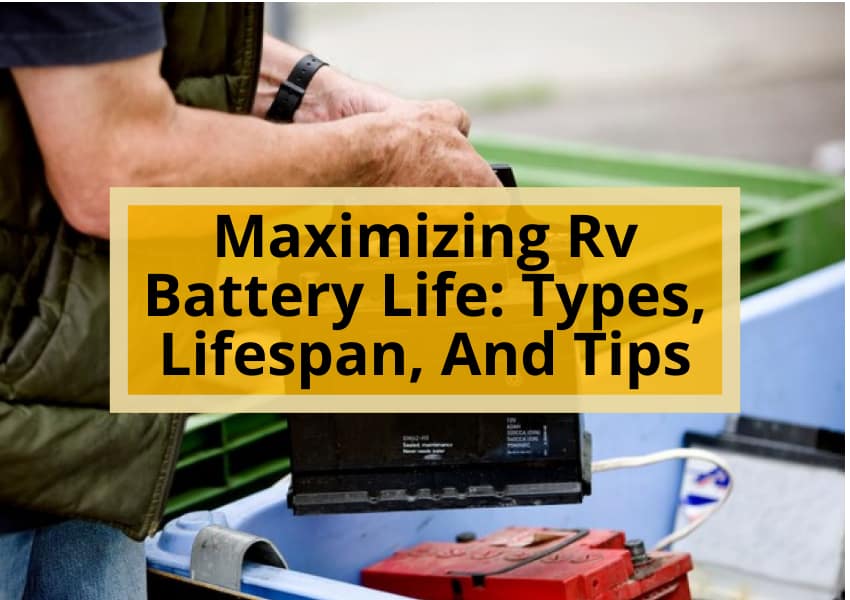RV batteries are essential for powering appliances, electronics, and starting the engine, making them a critical component of any RV. However, the lifespan of RV batteries varies depending on factors such as type, maintenance, and usage. Understanding the different types of RV batteries, their lifespans, and tips for prolonging their lifespan is crucial for any RV owner looking to maximize their RV battery life.
In this article, we will explore the different types of RV batteries and their unique characteristics, including their lifespan and maintenance requirements. We will also provide tips for prolonging the life of your RV batteries, such as proper charging and storage techniques.
Whether you are a seasoned RV owner or new to the lifestyle, this article will provide essential information for ensuring your RV batteries last as long as possible. By understanding the different types of RV batteries and implementing proper maintenance and storage techniques, you can avoid costly replacement expenses and ensure your RV battery is always ready to power your next adventure.

RV Battery Types
In exploring the types of RV batteries, it is important to consider the lifespan and maintenance requirements of each type.
Lithium ion and lead-acid batteries are the most common options.
Lithium ion batteries have a much longer lifespan compared to lead-acid batteries, with up to 10 years or more with up to 5,000 charge cycles.
They are also more cost-effective in the long run, despite the higher upfront cost.
Lithium ion batteries have a higher capacity, meaning they can store more power in a smaller space.
On the other hand, lead-acid batteries are cheaper upfront and have been around much longer, making them a more tried and tested option.
Despite the advantages, lithium ion batteries are susceptible to factors such as temperature and depth of discharge, which can affect their lifespan.
They require careful monitoring, and a battery monitor is recommended to prevent overcharging or undercharging.
In contrast, lead-acid batteries require regular maintenance to ensure their lifespan of 3-5 years.
Ultimately, the choice between lithium ion and lead-acid batteries will depend on the individual’s needs and budget.
also read : Maximizing Generator Runtime: Tips And Tricks
Lifespan and Maintenance
The maintenance practices and type of RV battery used significantly influence its durability. To maximize the lifespan of an RV battery, it is essential to adhere to proper maintenance practices. Here are some tips to help extend the lifespan of an RV battery:
- Regularly check the battery’s water levels and refill as needed. Failure to do so can lead to sulfation, which can damage the battery’s plates and shorten its lifespan.
- Avoid overcharging or undercharging the battery. Installing a battery monitor can help prevent this issue.
- Store the battery in a cool and dry place, away from direct sunlight. High temperatures can cause the battery to degrade quickly.
- When storing the RV for an extended period, disconnect the battery and store it in a cool place. This will help prevent the battery from draining and extend its lifespan.
Ignoring proper maintenance practices can lead to premature battery replacement, which can be costly. Therefore, it is essential to follow these tips to prolong the lifespan of an RV battery. Additionally, considering storage options is also crucial in maintaining the battery’s durability.
Tips for Prolonging Life
To extend the operational time of an RV battery, checking and maintaining its water levels regularly is critical as failure to do so can cause sulfation, leading to damage to the battery’s plates, which can shorten its lifespan by up to 50%. In addition to proper maintenance, using a battery monitor to prevent overcharging or undercharging can also help prolong the battery’s lifespan. This device can monitor the battery’s charge level and provide alerts when it needs to be charged or when it is reaching its maximum capacity.
Another way to prolong an RV battery’s lifespan is by using portable refrigerators. These refrigerators can reduce the battery load and extend its lifespan. They are also very convenient for camping trips as they allow for the storage of perishable items without the need for ice. It is important to ensure that multiple batteries are charged equally to avoid problems and that lack of maintenance can shorten the RV battery lifespan. By incorporating these tips, RV owners can maximize their battery’s lifespan and enjoy their trips without worrying about battery failure.
| Tip | Explanation |
|---|---|
| Regularly check and maintain water levels | Sulfation can damage the battery’s plates and shorten its lifespan by up to 50% if the water levels are not checked and maintained regularly. |
| Use battery monitoring devices | These devices can monitor the battery’s charge level and provide alerts when it needs to be charged or when it is reaching its maximum capacity. |
| Use portable refrigerators | These refrigerators can reduce the battery load and extend its lifespan. They are also convenient for camping trips as they allow for the storage of perishable items without the need for ice. |
| Ensure multiple batteries are charged equally | Uneven charging can lead to problems and shorten the lifespan of the batteries. |
| Lack of maintenance can shorten RV battery lifespan | Proper care and maintenance are important to prolong the RV battery’s lifespan and ensure that it performs optimally. |
Frequently Asked Questions
Can RV batteries be charged while driving?
RV batteries can be charged while driving using the vehicle’s alternator. This provides benefits such as convenience and extended battery life. However, there are limitations to this method, such as slower charging rates and potential damage to the alternator. Alternatives include using solar panels or a generator.
How often should RV batteries be checked for maintenance?
RV battery maintenance frequency depends on usage and battery type. Lead-acid batteries should be checked every 3-6 months, while lithium-ion batteries can go longer without maintenance. Battery testing methods include voltage testing, load testing, and specific gravity testing.
Is it recommended to use solar panels to extend RV battery life?
Using solar panels can extend RV battery life, but there are drawbacks such as cost, limited availability of sunlight, and maintenance. Alternatives include using a battery monitor, portable refrigerators, and proper maintenance.
How long does it take to fully charge an RV battery?
The time required to fully charge an RV battery depends on various factors, including the charging method, optimal charging time, the battery’s capacity, and the amount of current supplied. Factors affecting charging time include temperature, battery age, and type.
What is the average cost of replacing an RV battery?
The average cost of replacing an RV battery varies depending on the type and brand. Additionally, RV battery warranties may cover replacement costs. Battery disposal options should be checked with local regulations and recycling centers.






